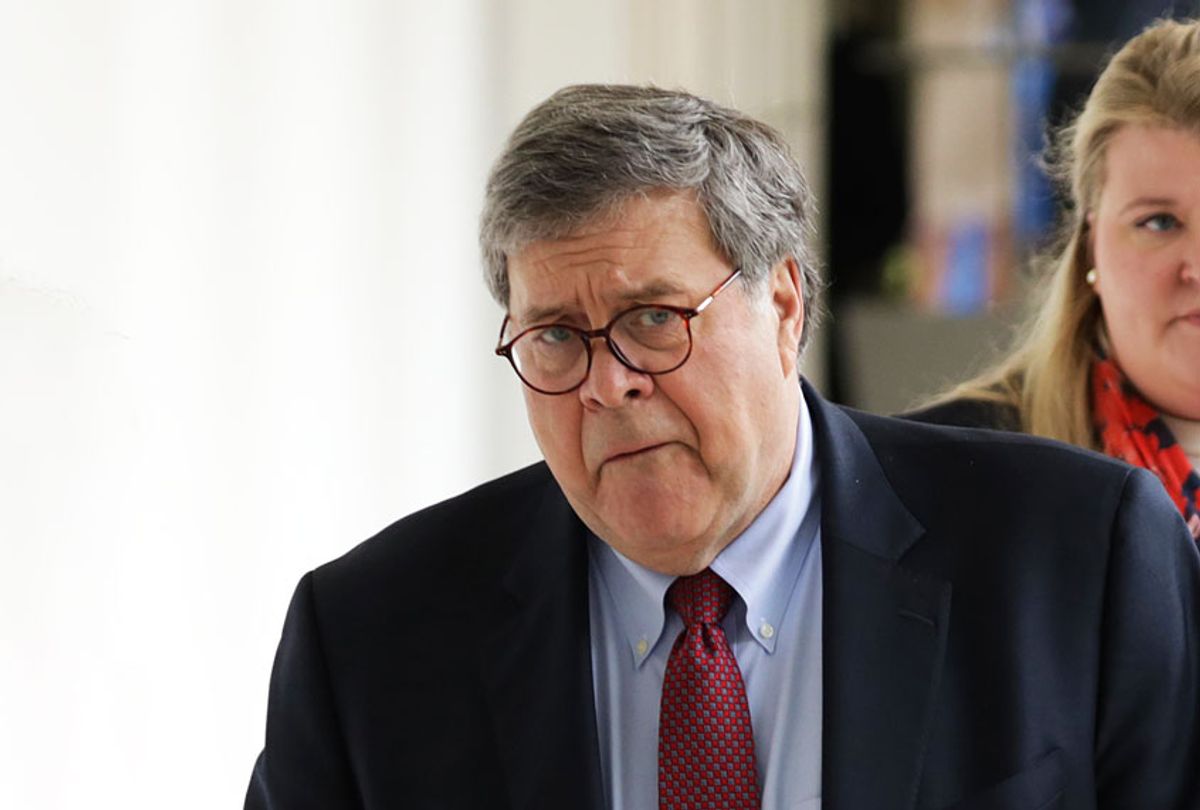Of all the bombastic statements ever uttered by Attorney General William "Bill" Barr, a remark made toward the end of a lengthy interviewwith CBS News in May will be remembered above the rest. Asked how "history" will look upon his controversial motion to dismiss the criminal charges that Special Counsel Robert Mueller brought against Michael Flynn for making false statements to the FBI, Barr raised his eyebrows, chortled loudly, and flashed a sly smile.
Then he answered:
"Well, history is written by the winner. So it largely depends on who's writing the history. But I think a fair history would say that it [the move to drop the Flynn case] was a good decision because it upheld the rule of law."
Barr's attempt to dismiss Flynn's prosecution went wildly awry. The dismissal motion was intensely litigated, and Flynn was still awaiting sentencing when, on November 25, President Trump issued the retired Army lieutenant general and former national security adviser a "full and unconditional pardon" for "any and all possible offenses" arising from the Mueller investigation. No matter that Flynn had twice pleaded guilty to the false statement charge. So much for the rule of law.
Barr's Justice Department responded to the pardon with another dismissal motion on Flynn's behalf. The motion was granted on December 8.
Flynn, for his part, responded to the pardon on social media with reckless abandon, tweeting an ad from the Washington Times that called for Trump to suspend the Constitution and "invoke limited martial law" to permit the military to conduct an election do-over.
The history of Barr's service as Trump's attorney general will no doubt be the subject of much future academic and political commentary. And while future historians may debate the details of his record, Barr will not be among the "winners" who will get to pass judgment on his performance as the nation's top law enforcement officer. To the contrary, Barr will go down as the second-biggest loser of the Trump era, subordinate only to Trump himself.
It may be tempting to look at Barr as something of a tragic figure, as someone who lost his moral compass and sacrificed his good name in fealty to a corrupt leader. Tempting, perhaps, but wrong.
Yes, it's true that a few Democrats, along with some influential mainstream legal commentators, supported Barr's nomination to become attorney general before his appointment in 2019. They believed he was an "institutionalist," and they hoped that he would be an improvement over his immediate predecessors, Jeff Sessions and Matthew Whitaker, who had disgraced the Department of Justice. They were fooled.
The real tragedy is that anyone left of center ever viewed Barr as a fair-minded institutionalist. The truth is that Barr has always been an aggressively partisan right-wing ideologue, bent on entrenching the most retrograde of GOP policies.
A longtime and fervent proponent of the "unitary executive" theory, which posits that all executive branch power is vested in the president and in its most extreme form amounts to a blueprint for presidential supremacy, Barr served as attorney general from 1991 to 1993 in the administration of George H.W. Bush. Barr is widely credited with using his position as attorney general at the time to secure pardons for six criminal defendants accused of breaking federal law in connection with the Iran-Contra scandal of the 1980s.
Two of the Iran-Contra pardons—granted to former Defense Secretary Caspar Weinberger and former CIA officer Duane Clarridge—were issued "preemptively," prior to conviction, in a fashion reminiscent of Gerald Ford's pardon of Richard Nixon and those Trump is reportedly contemplating for himself and members of his family and inner circle. For his work procuring the Iran-Contra pardons, Barr earned himself the nickname of the "Coverup-General."
After Trump nominated Barr to serve a second stint as attorney general, the ACLU issued a scathing report, asserting:
"During his time in government as well as in the private sector, Barr amassed a record of advancing policies that advocated dragnet government surveillance, mass incarceration, and discriminatory profiling while pushing an aggressive theory of expansive executive power that sidelines Congress' constitutional role in checking the president."
Since resuming the reins as attorney general, Barr has proven to be everything the ACLU feared, and more. From publicly mischaracterizing the findings of the Mueller report to defying congressional subpoenas, intervening in the sentencing of Roger Stone, forcing Geoffrey Berman to step down as U.S. attorney for the Southern District of New York, and allegedly giving the order to assault peaceful Black Lives Matter protesters outside the White House, Barr has strived to transform the Justice Department into a neofascist ministry of the interior dedicated to advancing the personal interests of the president rather than those of the nation.
And don't be misled by Barr's recent revelation, made in an interview with the Associated Press, that the DOJ has found no evidence of widespread voter fraud in the 2020 presidential election. Barr may have incurred Trump's ire with the disclosure and he may even be considering resignation as tensions with Trump mount, but as the multiple litigation debacles of Rudy Giuliani have shown, Barr simply stated the obvious to the AP—that there is no credible case of voter fraud to be made.
In the same interview, Barr disclosed that he had appointed U.S. Attorney John Durham as a special counsel to continue an ongoing probe into the origins of the Trump-Russia investigations conducted by both Mueller and the FBI. Unless Biden's new attorney general rescinds Barr's order, Durham will be in a position to perpetuate the corrosive right-wing myth that agents of the "deep state" had conspired to "stab [Trump] in the back" and cripple his presidency.
Durham's appointment is Barr's cynical parting gift to the country, illustrating once again that there is no honor or redemption to be found in the public works of Bill Barr. Not now, and, absent the unforeseeable, not ever.
This article was produced by the Independent Media Institute.




Shares